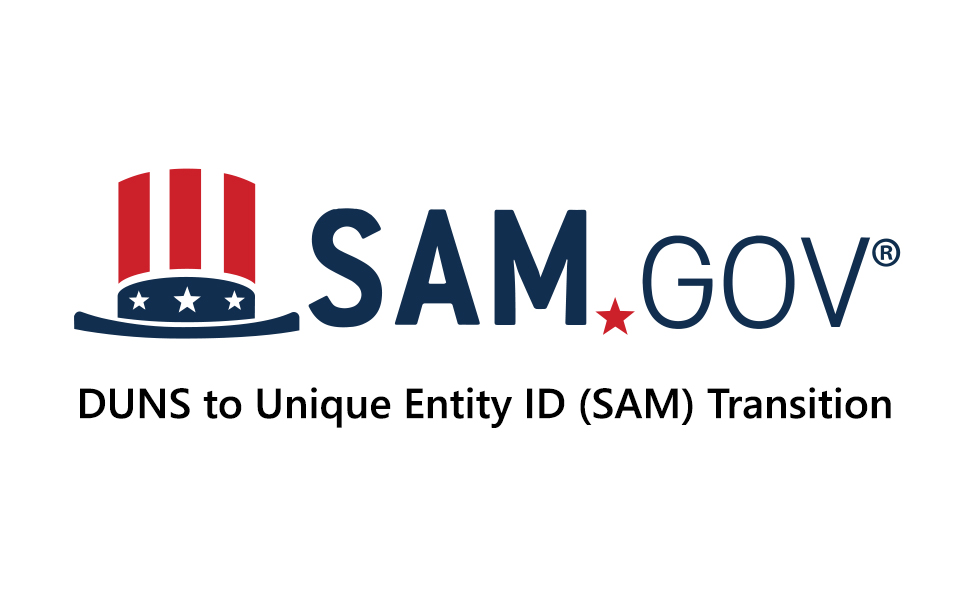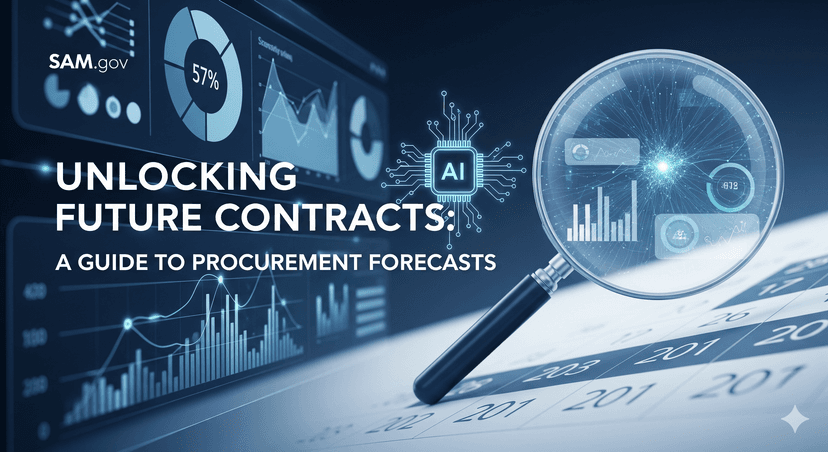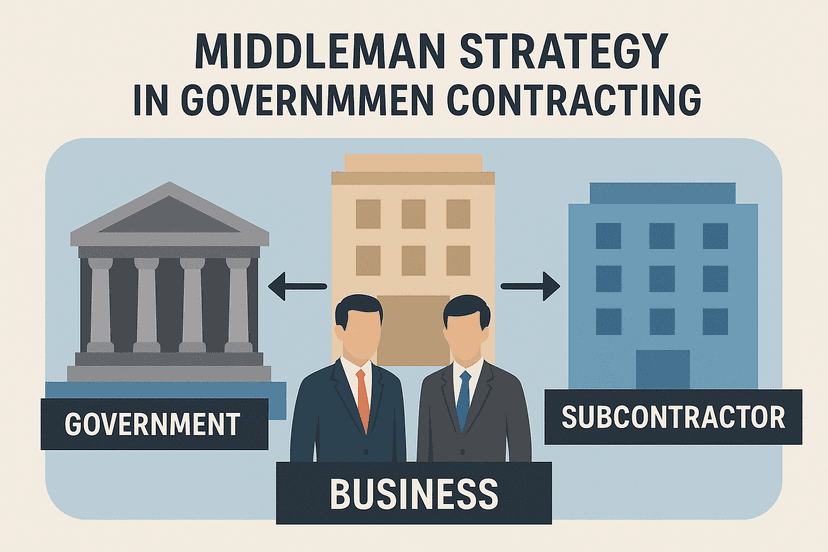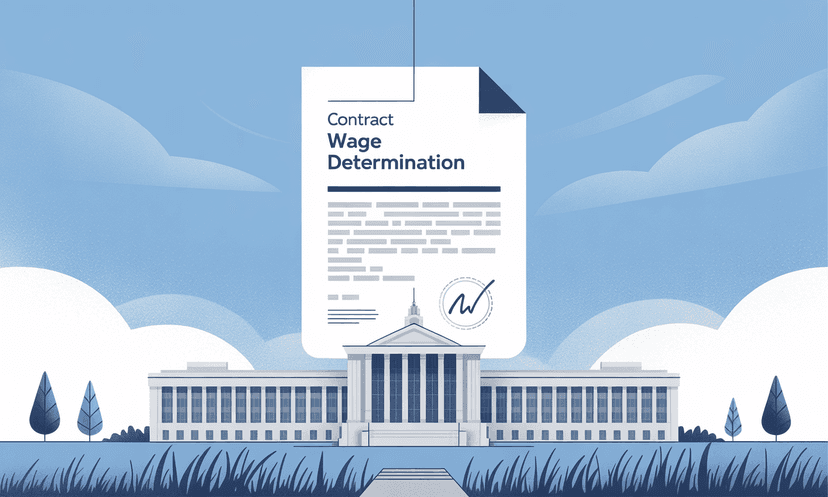How to Start a Government Contracting Company: A Step-by-Step Guide

Government contracting presents growing opportunities across a wide range of industries, from construction and IT to healthcare and defense. As government agencies continue to require goods and services, businesses that can meet these needs have access to a steady stream of contracts, both large and small. This market offers the potential for long-term projects, providing stability and consistent revenue for companies that can build relationships with government clients.
While the process of securing government contracts can seem complex, it’s not impossible. With the right guidance, businesses can navigate the requirements and find the best opportunities. Success in government contracting is achievable for anyone willing to learn the rules, register in the right systems, and submit competitive proposals.
1. Understand the Government Contracting Landscape
Government contracting involves businesses providing goods or services to government agencies at the federal, state, or local level. These contracts can range from small one-time projects to large, multi-year agreements. Government contracts are often competitive, with businesses submitting bids to secure the opportunity to work with government entities.
Types of Government Contracts
- Federal Contracts: These are contracts awarded by the federal government, typically managed by agencies like the Department of Defense (DoD), Department of Homeland Security (DHS), and more. Federal contracts tend to be larger in scale and scope.
- State Contracts: These contracts are issued by state governments and can vary greatly depending on the state’s needs. They may include a wide range of services, from infrastructure projects to IT services.
- Local Contracts: Local government contracts are typically smaller than federal or state contracts but can still offer valuable opportunities. These contracts often focus on municipal services, local construction projects, and community-based services.
For a deeper understanding of government contracting at the state and local levels, check out our SLED blog.

Samsearch chatbot: Example of question we asked from a solicitation's documents
Industries Involved in Government Contracting
Government contracting spans numerous industries, offering diverse opportunities:
- Defense and Aerospace: The U.S. government is one of the largest buyers of defense products and services, making this a major sector for contractors.
- Information Technology (IT): From cybersecurity to software development, government agencies require IT services and solutions to support their operations.
- Construction and Infrastructure: Government-funded construction projects, including roads, bridges, and government buildings, create significant contracting opportunities.
- Healthcare and Medical: Government contracts in healthcare cover services like medical research, pharmaceuticals, and healthcare management for federal agencies like the Veterans Affairs Department (VA).
- Education and Research: Many government contracts are awarded to educational institutions or research organizations for projects that benefit the public.
And the list goes on. The federal government offers a huge amount of purchasing power, but what's even better is that by law, they must provide opportunities for small businesses to win contracts. This creates a wealth of opportunities for businesses to work with the government. The key is understanding the basic steps to get started. Once you know how to launch a government contracting business, you'll be ready to start bidding on federal contracts.
Size and Scope of the Government Contracting Market
The government contracting market is vast and continually growing. In the U.S. alone, the federal government spends over $600 billion annually on contracts, and state and local governments contribute significantly to this total. The size and scope of government contracting opportunities are immense, offering a range of contracts from small-scale projects to large, multi-million-dollar deals.
2. Research the Requirements and Regulations
As a small business entering the world of government contracting, understanding key regulations and requirements is essential. Here are the most important regulations and certifications you need to know:
1. Federal Acquisition Regulation (FAR)
- What it is: The FAR governs how the federal government acquires goods and services. It sets the rules for bidding, contract execution, and payment.
- Why it matters: FAR applies to all federal contracts. Small businesses must follow FAR clauses when submitting proposals or fulfilling contracts.
- Reference: FAR Website
 example of FAR rules and regulations
example of FAR rules and regulations
2. Defense Federal Acquisition Regulation Supplement (DFARS)
- What it is: The DFARS supplements FAR and includes additional rules for defense-related contracts, particularly around cybersecurity and compliance.
- Why it matters: If you’re working with the Department of Defense (DoD), DFARS will apply. Compliance with its requirements is crucial for winning and maintaining defense contracts.
- Reference: DFARS Website
3. Small Business Administration (SBA) Guidelines
- What it is: The SBA defines the size standards for small businesses, offering programs and resources to help small businesses succeed in government contracting.
- Why it matters: Small businesses can benefit from special programs such as set-aside contracts, where certain contracts are reserved specifically for small businesses.
- Reference: SBA Small Business Size Standards
4. Small Business Certifications
-
Small Business Certification: Your business must meet the SBA’s size standards to qualify as a small business. This will determine your eligibility for small business set-aside contracts.
- Reference: SBA Small Business Certification
-
8(a) Certification: This program supports small businesses owned by socially and economically disadvantaged individuals. If eligible, you can access exclusive government contracts.
- Reference: SBA 8(a) Certification
-
HUBZone Certification: If your business is located in a historically underutilized business zone, you may qualify for the HUBZone program, which gives businesses a competitive edge for federal contracts.
- Reference: SBA HUBZone Certification
-
Veteran-Owned and Service-Disabled Veteran-Owned Business Certification: Businesses that are at least 51% owned by veterans or service-disabled veterans can apply for this certification to access specific government contracts set aside for veterans.
- Reference: Veteran-Owned Business Certification
-
Minority-Owned Business Certification: If your business is at least 51% minority-owned, you can apply for this certification, which may help you access contracts reserved for minority-owned businesses.
- Reference: Minority Business Development Agency
-
Women-Owned Small Business Certification: Businesses that are at least 51% woman-owned can apply for this certification, opening up opportunities in contracts set aside for women entrepreneurs.
- Reference: Women-Owned Small Business Program
6. Compliance with Labor Laws
- What it is: The government requires contractors to comply with various labor laws, such as the Service Contract Act (SCA) and Davis-Bacon Act, which regulate wages, working conditions, and benefits for workers on federal contracts.
- Why it matters: Non-compliance with labor laws can result in penalties, loss of contracts, and disqualification from future opportunities.
- Reference: Department of Labor - Wage and Hour Division
7. Cybersecurity Requirements
- What it is: Small businesses working on government contracts, especially defense contracts, must comply with cybersecurity requirements such as NIST SP 800-171 to protect sensitive information.
- Why it matters: Failure to meet these cybersecurity standards can prevent your business from securing contracts, particularly those related to defense or critical infrastructure.
- Reference: NIST Cybersecurity Framework
By understanding and complying with these regulations and certifications, small businesses can navigate the government contracting landscape more effectively.
3. Establish a Business Structure
Choosing the right business structure is one of the first steps when starting a government contracting business. The structure you choose will affect your taxes, liability, and other aspects of your business operations. Here’s a guide to help you get started:
1. Choosing the Right Business Structure
- LLC (Limited Liability Company): An LLC provides flexibility, limits personal liability, and offers pass-through taxation. It’s a popular choice for small businesses, especially those looking for personal protection without the complexity of a corporation.
- Corporation: A corporation (C-Corp or S-Corp) offers strong liability protection and allows for the issuance of stock, but it involves more administrative work and taxation at both the corporate and personal level (C-Corp) or pass-through taxation (S-Corp).
- Sole Proprietorship: This is the simplest form of business structure, where the business is owned and operated by one person. While easy to set up, it offers no personal liability protection, which can be risky for government contracts.
Tip: For government contracting, most small businesses opt for an LLC or corporation due to liability protection and credibility with clients.
Reference: Choosing a Business Structure - SBA
2. Obtaining an EIN (Employer Identification Number)

- What it is: An Employer Identification Number (EIN) is a unique identifier assigned to your business by the IRS. It’s needed for tax purposes, to open business accounts, and for hiring employees.
- Why it matters: You’ll need an EIN to apply for government contracts, especially federal contracts. It’s also required to file taxes, pay employees, and apply for various licenses and permits.
How to get an EIN:
- You can apply for an EIN online through the IRS website, and the process is free.
Reference: Apply for an EIN - IRS
3. Setting Up Business Accounts
- Business Bank Account: Open a separate bank account for your business to keep personal and business finances separate. This is crucial for financial management, especially when handling government contracts, which may require you to track expenses and income separately.
- Accounting System: Set up an accounting system to manage your finances. Consider using accounting software such as QuickBooks or FreshBooks to streamline your financial management and ensure you stay compliant with tax laws.
Reference: Setting Up a Business Bank Account
4. Registering with State Authorities
- State Registration: In addition to registering with the federal government (e.g., through SAM.gov), you may need to register your business with the state in which you are operating. This includes obtaining any necessary business licenses, state tax IDs, or permits.
- Why it matters: State registration helps you remain compliant with state laws, including taxes, employment, and business regulations.
Reference: Register Your Business - SBA
4. Register in Government Systems
To start working with the government, you need to be registered in key systems that manage contracts and business interactions. Here’s a step-by-step guide on how to register:
1. System for Award Management (SAM) Registration
- What it is: The System for Award Management (SAM) is the official database for federal contractors. To do business with the federal government, all businesses must be registered in SAM.
- Why it matters: Without an active SAM registration, your business cannot bid on or win federal contracts. SAM registration is free, but it must be updated annually.
How to register:
- Create a user account on SAM.gov.
- Complete your business profile, including details like your EIN, D-U-N-S number (if required), and NAICS code.
- Verify your business’s legal structure and certifications (small business, veteran-owned, etc.).
- Submit your registration and await approval.
Video Tutorial: Here’s a video tutorial on registering on SAM.gov to conduct business with the federal government.
Reference: SAM.gov Registration
2. Dynamic Small Business Search (DSBS)
- What it is: Dynamic Small Business Search (DSBS) is a database managed by the Small Business Administration (SBA) where federal contracting officers search for small businesses. Your SAM.gov profile will automatically be added to DSBS.
- Why it matters: Being listed in DSBS increases visibility and helps government buyers find your business when they are searching for contractors in specific industries or with specific capabilities.
Reference: DSBS Search
3. SBA’s 8(a) Program
- What it is: The SBA 8(a) Program is a business development program for small businesses that are socially and economically disadvantaged. The program helps businesses access exclusive government contracts.
- Why it matters: Being certified under the 8(a) program opens up opportunities for small businesses to win contracts that are set aside specifically for 8(a) firms.
How to apply:
- Complete the 8(a) application on the SBA website.
- Provide required documentation of your business’s eligibility, including proof of ownership, control, and financial condition.
- Await review and approval.
Reference: SBA 8(a) Program
4. State Registration
- What it is: In addition to federal registration, you may need to register with individual state government contracting systems to access state and local contracts.
- Why it matters: State and local governments also award contracts for a wide range of goods and services. Registering with state systems gives you access to these opportunities.
Reference: For state registration, you can view a list of state government contracting websites you can register with here.
Registering in SAM and other key databases, your business will be positioned to start bidding on and winning government contracts. Make sure to keep your registration updated annually to stay eligible for new opportunities.
5. Develop a Solid Business Plan

A well-structured business plan is essential for any small business, especially in the competitive world of government contracting. It not only guides your operations but also helps you make informed decisions and attract potential investors or partners. Here’s how to develop a solid business plan for your government contracting business:
1. Importance of a Clear, Focused Business Plan
- A business plan serves as your roadmap to success. It helps you define your goals, strategies, and financial outlook. In the government contracting space, having a clear plan demonstrates professionalism and helps you stay organized as you navigate complex contracting processes.
- A solid business plan is often required when applying for funding or pursuing large government contracts, so it’s crucial for both your growth and credibility.
2. Key Components of a Business Plan
-
Market Analysis: Understanding the government contracting market is vital. Conduct research to identify current trends, potential customers (federal, state, and local agencies), and any specific sectors that are growing or underserved. Look for contracts in areas that align with your business strengths.
- Tip: Leverage tools like USASpending.gov to identify contracting opportunities, or check out SamSearch statistics to gain insights into the types of contracts available and market trends.
-
Financial Projections: Government contracts often involve large projects with long timelines. Include detailed financial projections, including startup costs, revenue forecasts, and cash flow analysis. These projections will help you plan for growth and manage risk.
- Tip: Consider the payment cycles of government contracts, as they can differ from private-sector agreements.
-
Competitive Advantage: Identify what sets your business apart from others in the government contracting space. This could be unique expertise, a track record of successful projects, or specialized certifications like 8(a) or HUBZone status.
- Tip: Consider leveraging certifications that help you compete in niche markets or areas that are underserved by other contractors.
-
Marketing Strategy: Your marketing strategy should focus on how you plan to get your business in front of government decision-makers. This includes identifying which agencies you will target, building relationships with procurement officers, and utilizing platforms like SAM.gov to increase visibility.
- Tip: Network with industry groups and attend government contracting events to make connections.
3. Identifying a Niche Within Government Contracting
- One way to stand out in the competitive government contracting market is by identifying a specific niche. This can help you focus your marketing efforts and build specialized expertise. Consider focusing on a particular industry (e.g., defense, IT, healthcare) or offering services in areas where there is high demand but few competitors.

-
Examples of niches:
- Cybersecurity for defense contracts
- Construction services for local government infrastructure projects
- Software development for federal IT modernization projects
- Landscaping for government agenices
-
By narrowing your focus, you can position your business as a go-to expert in that niche, making it easier to win contracts and build a reputation in the government sector.
A well-thought-out business plan will help you focus your efforts, understand your market, and manage growth in the competitive world of government contracting. Take the time to create a detailed plan that outlines how you will succeed in this complex and rewarding industry.
6. Identify Contract Opportunities
Finding the right government contracts is a critical step in growing your business. Fortunately, there are several portals and platforms where you can search for opportunities. Here’s how to identify and track the best contracts for your business:
1. Government Contracting Portals
There are numerous portals for finding government contracts, each with specific features to help you locate the best opportunities:
- sam.gov: The primary portal for federal contracts. All federal contracting opportunities are listed here, including requests for proposals (RFPs), contract awards, and notices of intent. Make sure your business is registered in SAM.gov to access these opportunities.

- State and Local Databases: Each state and local government has its own set of contracting opportunities. These can often be found through individual government websites or dedicated state procurement portals. You can explore these opportunities and start building relationships with local buyers.
- Tip: For state and local government contracts, check out the list of state procurement websites here.
2. Using SamSearch for Better Opportunities
One of the most efficient ways to find both federal and SLED (state, local, and educational) government contracts is through SamSearch. This platform uses artificial intelligence to help match your business with the perfect contract opportunities based on your company profile.
-
How SamSearch Works: Once you create your business profile on SamSearch, the platform uses AI to analyze your capabilities, certifications, and preferences, then matches you with contracts that are the best fit.
-
Benefits:
- AI-Powered Matches: SamSearch’s AI helps you filter through numerous opportunities and highlights the most relevant ones, saving you time and effort.
- Federal and SLED Opportunities: SamSearch allows you to search both federal and state/local government contracts, ensuring you don’t miss out on valuable opportunities.
-
How to Search Effectively:
- Set Up Your Profile: Ensure your business profile is complete with all relevant details such as certifications, industry focus, and experience.
- Use Filters: SamSearch offers various filters to help narrow down results based on contract size, agency, location, and other criteria.
- Track Opportunities: SamSearch makes it easy to track contracts you're interested in and receive alerts when new opportunities that fit your profile arise.
Reference: Learn more about SamSearch and how it can help you find the best government contract opportunities.
Using the right tools and taking a strategic approach to searching for contracts, you can streamline your efforts and connect with the most relevant opportunities, both at the federal and state/local levels. Leveraging AI-powered platforms like SamSearch can significantly improve your chances of success in the competitive world of government contracting.
7. Build a Strong Network and Partnerships
Building relationships is one of the most important steps in succeeding in government contracting. In this industry, connections can open doors to new opportunities and valuable collaborations. Here’s how to build a strong network and form meaningful partnerships:
1. Importance of Building Relationships
- Government Agencies: Establishing connections with key procurement officers and decision-makers within government agencies is crucial. These relationships can help you understand the agency’s specific needs, increase your chances of winning contracts, and ensure that your proposals are well-targeted.
- Prime Contractors: Many government contracts are awarded to prime contractors who may subcontract work to small businesses. By forming partnerships with prime contractors, you can gain access to subcontracts and participate in larger projects. These relationships can also serve as stepping stones for bigger opportunities in the future.
- Other Small Businesses: Collaborating with other small businesses can be mutually beneficial. Consider teaming up with businesses that complement your services, allowing you to bid on more comprehensive contracts and expand your capabilities.
2. Attending Industry Events and Conferences
-
Government Contracting Events: Many government agencies and industry groups host conferences and networking events specifically for contractors. Attending these events is an excellent way to meet procurement officers, other contractors, and professionals in the field.
- Tip: Look for events like The National 8(a) Association Conference or GovCon events in your area to connect with other small business owners and government representatives.
-
Workshops and Seminars: Many events offer workshops or seminars designed to help small businesses navigate the government contracting process. These sessions can provide valuable insights into how the government awards contracts and tips for improving your proposals.
 example of event by a government agency
example of event by a government agency
3. Networking with Procurement Officers
- Establishing a strong relationship with procurement officers can give you an edge when applying for contracts. These officers often have insights into upcoming projects and can guide you on how to better position your business for success.
- Tip: Reach out to procurement officers early to introduce your business. Regular communication helps establish trust and ensures that your business is top of mind when new opportunities arise.
4. Building a Strong Reputation
- Deliver High-Quality Work: The most effective way to build a reputation in government contracting is by consistently delivering excellent work. Meeting deadlines, staying within budget, and providing high-quality results will earn you a strong reputation, which can lead to repeat business.
- Stay Reliable: Government contracts often involve long timelines, so reliability is key. Being dependable and transparent throughout the project will help you build credibility and trust with clients.
- Leverage Testimonials and Case Studies: Once you’ve successfully completed projects, ask clients for testimonials and case studies to showcase your capabilities. These can be invaluable when bidding for future contracts.
8. Submit Competitive Bids and Proposals

Submitting a well-crafted proposal is one of the most important steps in securing a government contract. Government agencies receive numerous bids, so it’s essential to ensure your proposal stands out. Here’s a guide to writing and submitting competitive proposals:
1. Writing and Submitting a Proposal
-
Understand the RFP: Start by carefully reading the Request for Proposal (RFP) or solicitation document. The RFP will outline the agency’s needs, specific requirements, evaluation criteria, and submission instructions.
-
Follow Instructions: Ensure that you follow all the instructions laid out in the RFP. Failure to comply with even small details, such as formatting or submission deadlines, can result in your proposal being disqualified.
-
Submit on Time: Government contracts often have strict submission deadlines. Make sure to allow plenty of time for writing, reviewing, and submitting your proposal to avoid rushing at the last minute.
Reference: For more details on how to write a winning proposal, check out our proposal writing guide.
2. Key Elements of a Strong Proposal
A competitive proposal is thorough, well-structured, and clearly demonstrates your understanding of the project. Key components to include are:
-
Compliance: Ensure that your proposal meets all the requirements outlined in the RFP, including any legal or regulatory stipulations (e.g., FAR compliance). If the agency requires certifications such as small business or minority-owned status, make sure to provide evidence of eligibility.
-
Value Proposition: Clearly articulate the value your business brings to the project. This includes how your solution is the best choice for the agency’s needs, the unique benefits you provide, and how your company can deliver the project effectively.
-
Pricing: Government agencies want a fair and reasonable price for services. Be transparent and realistic in your pricing, and ensure it aligns with the project’s scope. Provide a detailed cost breakdown, but avoid underpricing, which can make your proposal look unprofessional or raise questions about your ability to deliver.
3. Tailoring Your Proposal to the Agency's Needs
Each government agency has unique needs and priorities. To make your proposal stand out, tailor it to the specific requirements and goals of the agency you’re bidding with:
-
Research the Agency: Understand the agency’s mission, past projects, and any challenges they may face. This will help you align your proposal with their objectives.
-
Address Key Concerns: Government agencies often look for specific outcomes such as cost efficiency, reliability, and compliance. Be sure to highlight how your solution addresses these concerns.
-
Use Case Studies and Past Performance: Include relevant experience or case studies that demonstrate your ability to deliver similar projects. This builds credibility and shows that you are capable of handling the scope of the contract.
4. Using AI to Enhance Your Proposal Writing
Writing a proposal can be time-consuming, but leveraging tools like SamSearch's AI-powered Proposal Writer can significantly streamline the process. SamSearch’s AI helps you craft tailored proposals by analyzing the RFP and matching it with your business’s profile and previous successes. This ensures your proposal aligns with the agency’s needs, while also saving you time in drafting the content.
Reference: For more details on how to write a winning proposal, check out our proposal writing guide.
Utilizing tools like SamSearch’s AI-powered Proposal Writer, you can significantly increase your chances of winning government contracts. Remember, tailoring your proposal to meet the specific needs of the agency is key to standing out in a competitive bidding process.
9. Focus on Ongoing Compliance and Performance
Once you’ve secured a government contract, maintaining compliance and delivering strong performance is crucial to building long-term success in government contracting. Here’s how to manage your contracts effectively:
1. Managing Contracts and Ensuring Compliance
- Stay Aligned with Terms and Conditions: Carefully review and understand the contract’s terms and conditions before beginning any work. Ensure that your company follows all clauses, including deadlines, reporting requirements, and any legal obligations.
- Monitor Milestones: Government contracts often include specific milestones that must be met. Keep track of project progress and ensure that all deliverables are submitted on time and meet the agency's expectations.
- Keep Accurate Records: Documentation is essential. Maintain accurate records of all activities, communications, and expenditures related to the contract. This will help ensure compliance and provide proof in case of audits or disputes.
2. Performance Evaluations
- Stay on Top of Performance Metrics: Many government contracts include performance evaluations. Be proactive in monitoring your progress to ensure that your business is meeting the performance standards outlined in the contract.
- Feedback and Improvement: If performance evaluations highlight areas for improvement, take it as an opportunity to refine your processes and improve the quality of your work. Positive evaluations can lead to more opportunities, while negative evaluations can hurt your reputation.
3. Clear Communication and Meeting Deadlines
- Open Communication: Maintaining open and transparent communication with the agency is vital. If any challenges arise during the project, inform the agency early on and work together to resolve issues.
- Meeting Deadlines: Government contracts have strict deadlines. Failing to meet these deadlines can lead to penalties or loss of future opportunities. Ensure that your team is well-organized and focused on meeting every deadline.
10. Scaling and Growing Your Government Contracting Business
Once you’ve successfully managed smaller government contracts, it’s time to scale your business. Here’s how to pursue larger contracts and expand your capabilities:
1. Pursuing Larger Contracts
- Gradual Expansion: Start by bidding on contracts that match your current capabilities and gradually increase the scale of the projects you take on. As you gain more experience and confidence, begin bidding for larger contracts with higher revenue potential.
- Building a Strong Track Record: Winning smaller contracts and delivering exceptional results will help you build a strong portfolio. This will make you more competitive when bidding for larger, more complex contracts.
2. Diversifying Contract Types
- Federal, State, and Local Contracts: Don’t limit your business to just federal contracts. Explore state and local government contracts (SLED) as well. Each level of government has its own set of opportunities, and expanding into these areas can help diversify your income streams.
- Tip: By using platforms like SamSearch, you can search for both federal and SLED opportunities in one place, making it easier to find and apply for multiple contracts.
3. Building a Team and Expanding Your Capabilities
- Hiring the Right People: As your business grows, you may need to hire additional staff to handle the increased workload. Consider bringing in experienced professionals who can help manage contracts, handle compliance, and ensure high-quality performance.
- Expanding Your Services: Diversifying your offerings can help you compete for a wider range of contracts. Consider expanding your services or forming partnerships with other companies to handle larger or more diverse contracts.
- Investing in Technology: Using software and tools to streamline operations can increase efficiency as your business scales. Tools for project management, contract tracking, and financial reporting can help you manage multiple contracts simultaneously.
Frequently Asked Questions (FAQ)
1. What is government contracting?
Government contracting refers to the process by which private businesses provide goods or services to government agencies at the federal, state, or local level. These contracts can be for a wide range of needs, from construction and IT services to healthcare and defense.
2. How do I start a government contracting business?
Starting a government contracting business involves several key steps:
- Researching government regulations and certifications
- Registering in government systems like SAM.gov
- Developing a solid business plan
- Identifying contract opportunities
- Writing competitive proposals. Following these steps will help you successfully navigate the government contracting landscape.
3. Do I need a specific certification to bid on government contracts?
For small businesses, certifications such as small business, minority-owned, veteran-owned, or woman-owned can help you access set-aside contracts. These certifications demonstrate that your business meets certain criteria and can give you a competitive advantage in the bidding process.
4. How do I find government contracts?
Government contracts can be found through platforms like SAM.gov for federal contracts and state/local databases for SLED opportunities. Tools like SamSearch can also help you identify contracts and match them to your business profile using AI.
5. What is SAM.gov and why is it important?
SAM.gov (System for Award Management) is the primary portal for businesses wishing to do business with the federal government. It is essential to register your business on SAM.gov to be eligible for federal contracts. This registration ensures that your business meets government requirements and can be paid for services rendered.
6. How can SamSearch help my government contracting business?
SamSearch is an AI-powered platform that helps businesses find the best government contract opportunities. By analyzing your company profile, SamSearch matches you with relevant contracts, saving time and ensuring you find the most suitable opportunities.
7. What are the most common types of government contracts?
The most common types of government contracts are:
- Fixed-price contracts: Where the price is set at the outset.
- Cost-reimbursement contracts: Where the government reimburses the contractor for their costs, plus an additional fee.
- Indefinite delivery contracts: Where services are provided as needed, without a specific end date.
8. How long does it take to get a government contract?
The time it takes to secure a government contract can vary, depending on the complexity of the contract and the agency's process. On average, it can take several months from submitting a proposal to being awarded a contract.
9. How do I increase my chances of winning a government contract?
To increase your chances of winning, make sure your proposal is tailored to the agency’s needs, highlights your unique strengths, and meets all compliance requirements. Building a strong network and continuously improving your performance on smaller contracts can also help improve your reputation in the industry.
10. What are the common mistakes businesses make in government contracting?
Some common mistakes include:
- Failing to understand the terms and conditions of the contract.
- Submitting proposals that don't align with the agency’s requirements.
- Underpricing or overpricing in bids.
- Not maintaining proper records or documentation for compliance. Avoiding these mistakes will help you build a stronger foundation for success in government contracting.
Conclusion
Starting a government contracting business can be a rewarding venture, offering long-term stability and substantial growth opportunities. By following the steps outlined—researching requirements, establishing a solid business structure, registering in government systems, identifying contract opportunities, and building a strong network—you’ll be on your way to securing government contracts and growing your business.
However, it's important to remember that success in government contracting takes time. The process may seem overwhelming at first, but with persistence, patience, and the right guidance, you can achieve your goals and build a successful business.
To help you along the way, tools like SamSearch can simplify the process of finding and bidding on government contracts. With SamSearch's AI-powered platform, you can match your company profile to the perfect government contract opportunities, saving time and effort.
Ready to take the next step? Sign up Now or schedule a consultation to learn how SamSearch can help streamline the process of finding and bidding on government contracts. Let us help you unlock new opportunities and grow your government contracting business!














